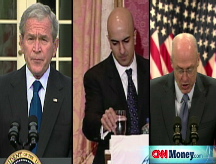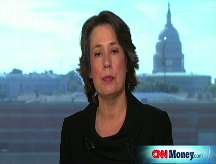Your vote, your crummy highways
The economy is in trouble - so are the roads, bridges and trains it depends on. Here's a close look at how the candidates would fix the problem.
NEW YORK (CNNMoney.com) -- The economy isn't the only thing falling apart in the United States.
Much of the nation's infrastructure - the highways, bridges, airports and transit lines that keep the American economy humming - is also crumbling and in dire need of improvement. Clearly, a top job for the next president will be finding the funds to fix these sprawling systems.
In fact, it would take $1.6 trillion over five years to address the nation's infrastructure problems, according to a 2005 report by the American Society of Civil Engineers, which gave the country's system a "D."
Both presidential candidates have acknowledged the importance of rebuilding the roads and rails, but have offered very different solutions. John McCain, the Republican nominee, advocates shifting financing from earmarks to high-priority projects, while Barack Obama, his Democratic challenger, would create a federally-funded bank to invest in improvement projects.
Experts, however, say what's really needed is money and a lot of it.
One of the main reasons the nation is in this sorry state is that the federal government has pulled back on funding improvement projects. Fifty years ago, the federal government allocated 10% of its non-defense spending on infrastructure, said Polly Trottenberg, executive director of Building America's Future, a coalition of elected officials advocating increased infrastructure funding. Nowadays, the amount has shriveled to between 3.5% and 4%.
"A significant increase in investment is required at all levels," said John Horsley, executive director of the American Association of State Highway and Transportation Officials, a trade group. "We can't deliver services and sustain the highways and bridges."
Whoever wins will have to address the issue next year since Congress must reauthorize the federal transportation spending law, which expires in September 2009. The current law, approved in 2005, allocates $286 billion to highway and transportation projects.
"The next administration will have an important role to play in setting the vision for the federal transportation program for the 21st century," said Robert Puentes, fellow at the Brookings Institution's Metropolitan Policy Program.
His plan: The Republican presidential nominee is famous for his opposition to earmarks. He's made it a hallmark of his campaign. Instead of funneling money to crumbling highways and bridges, many of these earmarks go to building bike paths, beautifying highways or constructing "bridges to nowhere," he said a year ago, speaking out against a transportation spending bill.
"Funding for transportation infrastructure and transportation safety is of enormous importance," said McCain, who chaired the Senate Commerce, Science and Transportation Committee when the Republicans controlled the Senate between 1997 and 2005. "But we simply must do so in a fiscally responsible manner. If Congress fails to recover from its addiction to earmarks, then crumbling bridges, congested highways, and crowded airports will continue much to the determent of all Americans."
Instead, McCain would address the problem by determining how much the federal government can spend on infrastructure and making sure the money gets to the most pressing projects first, his advisers say. He favors funding the projects through the budget so proposals can be scrutinized every year. And he wants more input from state and local governments on what projects they think should get top priority.
"You have to have a commitment to saying we have genuine infrastructure needs," said Douglas Holtz-Eakin, McCain's senior economic policy adviser. "We cannot simply write checks to everyone who raises their hand. We have to develop a system that identifies national priorities and ensures the funding goes there."
Experts say: Most applaud McCain for his desire to end earmarks, which they say divert money from critical projects. Earmarks accounted for about 15% of the current transportation law, Horsley said.
Otherwise, McCain has offered little insight into how much federal funding he'd set aside for infrastructure and what projects he'd support.
"What will replace earmarks? That's the great open question," said James Burnley, former McCain adviser and transportation secretary in the Reagan administration.
His plan: The centerpiece of the Democratic presidential nominee's infrastructure plan is a $60 billion National Infrastructure Reinvestment Bank, which would expand and enhance existing federal projects. It would also seek to bring in private-sector funds.
The bank would be funded over 10 years with money saved by reducing the nation's involvement in Iraq.
"But when it comes to rebuilding America's essential but crumbling infrastructure, we need to do more, not less," Obama said in June before the U.S. Conference of Mayors. "Maintaining our levees and dams isn't pork barrel spending, it's an urgent priority, and that's what we'll do when I'm president. The work will be determined by what will maximize our safety, security, and shared prosperity."
In addition to improving roads, Obama supports investing in mass transit to bolster metropolitan areas. He also supports investing in high-speed trains.
Obama is also looking at infrastructure as an opportunity to stimulate the economy. He estimates that the projects the bank finances would create up to two million jobs - both those directly involved in the project and indirectly supporting it, such as suppliers - and generate approximately $35 billion a year in economy activity.
In addition, Obama wants to create a $25 billion emergency Jobs and Growth Fund to replenish the Highway Trust Fund, prevent cuts in road and bridge maintenance and fund school repairs. It would create or save one million new jobs.
Experts say: Obama has consistently supported greater spending on infrastructure. They were also pleased he did not advocate suspending the federal gas tax.
Most favor the creation of an infrastructure bank that can harness the financial power of the private sector, which is increasingly interested in leasing or investing in highways and airports. Setting up such a bank also would make the federal government more involved in infrastructure projects than it is now.
Still, $60 billion over 10 years is a far cry from what's needed to address the nation's crumbling roads and bridges, they said.
"It would be a small improvement," Puentes said. "There's still a long way to go." ![]()






